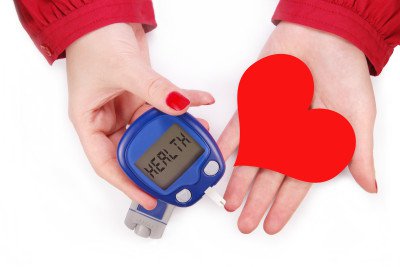Heart Disease and Diabetes
 You probably have heard about heart disease, or you may know someone who has a heart condition—but you may not know exactly what that really means. Heart disease is an overall term for several types of heart problems. Heart failure and atrial fibrillation are two of the most common heart problems. Having diabetes increases your risk for getting one or both of these.
You probably have heard about heart disease, or you may know someone who has a heart condition—but you may not know exactly what that really means. Heart disease is an overall term for several types of heart problems. Heart failure and atrial fibrillation are two of the most common heart problems. Having diabetes increases your risk for getting one or both of these.
HEART FAILURE
What is heart failure?
Heart failure is a condition in which your heart is not able to pump blood to the rest of your body as it should. But it does not necessarily mean that your heart has failed or stopped working. Instead, it means that your heart can’t pump enough oxygen and nutrients to meet your body’s needs.
Your heart is a muscle made up of four chambers. If your heart is weakened, your blood moves more slowly through your heart. This causes the pressure in your heart to increase. The chambers inside your heart try to help by stretching so that they can hold more blood. This works for a time, but eventually the muscle walls of these chambers become thicker, weaker and stiffer. This causes your heart to get larger.
As the blood flowing out of your heart slows, the blood that returns to your heart gets backed up. This causes swelling in your feet and legs and also in your lungs, which can cause you to be short of breath.
What causes heart failure?
There are several conditions that can cause heart failure. Those include diabetes, high blood pressure, coronary heart disease and sleep apnea.
What are the symptoms of heart failure?
- Not everyone has symptoms of heart failure, at least early on, but the symptoms include:
- shortness of breath—especially when lying flat.
- swelling of your legs and/or ankles and feet.
- weakness, dizziness and fatigue.
- fast or irregular heartbeat.
How do you know if you have heart failure?
Heart failure is diagnosed by your symptoms, medical history, physical exam and other tests, such as an electrocardiogram (EKG), chest x-ray, stress test, cardiac catheterization and echocardiogram.
What is the treatment for heart failure?
There are different stages of heart failure. The treatment depends on the stage of your condition. The goal of the treatment is usually to slow down the progression of heart failure and to improve your symptoms and quality of life. People with diabetes often take heart medicines to keep their condition under control. One common type of heart medicine is called ACE inhibitors, and
another is called ARBs. But before taking any of these medications, it is essential to seek medical advice first. Your healthcare provider may also prescribe other heart medicines, including those that help your body get rid of excess fluids, to help relieve the symptoms of your condition.
Along with medicines, you also need to limit your sodium intake and possibly your fluid intake. Fluid buildup from heart failure can cause you to gain weight, so it’s helpful to weigh yourself every day. If you gain 3 pounds in one day or 5 pounds in one week, call your healthcare provider.
ATRIAL FIBRILLATION
What is atrial fibrillation?
Atrial fibrillation is the most common type of irregular heartbeat. When your heart beats, the two upper chambers of your heart squeeze together, followed by the two lower chambers. Your heart’s electrical system controls this. If you have atrial fibrillation, the electrical system is off. This causes your atria to quiver rather than squeeze together. Your heart can’t pump your blood out of these chambers, so the blood may pool and clot. If a blood clot leaves your heart and goes into an artery of your brain, you can have a stroke. About 15 percent of strokes are caused by atrial fibrillation.
What causes atrial fibrillation?
Atrial fibrillation is closely related to aging, high blood pressure, coronary artery disease, heart failure, sleep apnea and strokes. Diabetes is also a risk factor for atrial fibrillation.
What are the symptoms of atrial fibrillation?
Not everyone with atrial fibrillation has symptoms, but common symptoms are:
- irregular and/or rapid heartbeat.
- heart palpitations—feeling your heart pounding inside your chest.
- tiring easily.
- dizziness.
- chest pain.
- How do you know you have atrial fibrillation?
Atrial fibrillation is most often diagnosed by an electrocardiogram or other types of heart monitors.
What is the treatment for atrial fibrillation?
The goals of treatment are to regain a normal heart rate and rhythm, to prevent blood clots, and to prevent strokes.
Your healthcare provider will recommend medications based on your heart rhythm and symptoms, as well as medications to prevent blood clots and to reduce your risk of having a stroke. The two common medications to prevent stroke are warfarin and aspirin. The American Heart Association reports that long term use of warfarin in people with atrial fibrillation and other stroke risk factors can reduce stroke by 68 percent.

